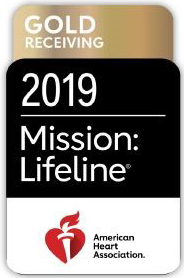UM BWMC Honored with Cardiac Award

Glen Burnie, MD — For the sixth consecutive year, University of Maryland Baltimore Washington Medical Center (UM BWMC) has received the Mission: Lifeline® STEMI Receiving Center Gold Quality Achievement Award for implementing specific quality improvement measures outlined by the American Heart Association for the treatment of patients who suffer severe heart attacks. In order to receive the Gold award level, organizations must meet specific criteria for at least two consecutive calendar years. UM BWMC has received the Mission: Lifeline award since its inception in 2010 starting with a Bronze award from 2010 to 2012. UM BWMC received Silver in 2013 and Gold from 2014 to present.
Each year in the United States, approximately 250,000 people have a STEMI, or ST-segment elevation myocardial infarction, caused by a complete blockage of blood flow to the heart that requires timely treatment. To prevent death, it’s critical to immediately restore blood flow, either by surgically opening the blocked vessel or by giving clot-busting medication.
The American Heart Association’s Mission: Lifeline program helps hospitals, emergency medical services and communities improve response times so people who suffer from a STEMI receive prompt, appropriate treatment. The program’s goal is to streamline systems of care to quickly get heart attack patients from the first 9-1-1 call to hospital treatment.
“UM BWMC is dedicated to providing optimal care for heart attack patients,” said Deborah Hall, MSN, MBA, RN, CCNS, CPHQ, FACHE, Vice President, Quality & Patient Safety at UM BWMC. “We are pleased to be recognized for our dedication and achievements in cardiac care through Mission: Lifeline.”
With nearly 100,000 visits per year to its Emergency Department, UM BWMC sees a significant number of patients who present with chest pain symptoms. The ability to quickly identify those with a STEMI and restore blood flow is critical.
UM BWMC earned the award by meeting specific criteria and standards of performance for the quick and appropriate treatment of STEMI patients to open the blocked artery. Before patients are discharged, they are started on aggressive risk reduction therapies such as cholesterol-lowering drugs, aspirin, ACE inhibitors and beta-blockers, and they receive smoking cessation counseling if needed. Eligible hospitals must adhere to these measures at a set level for a designated period to receive the award.
###
